
No. 7, 2022 | 9 June 2022
Go to:
From FRSA's Executive Director
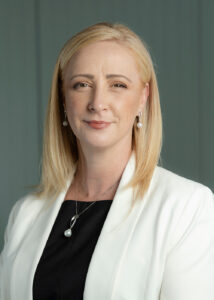
The end of financial year is always a busy time for organisations, and FRSA is no exception. But it also brings the promise of a new business year – a fresh start. I can’t help but feel excited as I work with my Board and team on our refreshed strategic directions and new projects for 2022-23.
And, with a new Government now firmly in place, the feeling of political ‘change’ in the air also brings a sense of freshness and anticipation to our work. Since the last edition of the eBulletin, Labor has achieved a majority Government and the new Ministry has been appointed. FRSA congratulates and welcomes the new Ministry and Shadow Ministry. I look forward to working with the Attorney-General, the Hon Mark Dreyfus QC MP and the Minster for Social Services, Hon. Amanda Rishworth MP, and with the Coalition Shadow Ministers’ (read more on our new Attorney-General and Minister for Social Services below).
Next Wednesday 15 June is World Elder Abuse Awareness Day. Elder abuse is an issue that has been on my mind, no doubt intensified by the findings of the National Elder Abuse Prevalence Study, which was released at the end of December last year. Elder abuse is not an issue that has historically firmly sat in FRSA’s purview. This is certainly not because we don’t view it as an important issue. As the peak body for family and relationship services that are funded by the Australian Government through the Families and Children Activity, elder abuse sits indirectly in our sector’s remit. Some services under the Families and Children Activity are indeed relevant to the issue of elder abuse – mediation and relationship counselling for example. Our services do not preclude older Australians experiencing relationship issues, including high conflict and abuse. But nor do our services, as framed within the Families and Children Activity, explicitly encompass the experiences and service needs of older Australians. This needs to change.
The FRSA Conference, held in Adelaide in May, provided a solid and engaging stream of presentations on the theme of Ageing, including elder abuse and neglect. Over the coming weeks we hope to have as many presentation slides as possible from these presentations (and all Conference streams) on our website. The Conference ended with a powerful and motivating panel discussion with the Age Discrimination Commissioner, the Hon Dr Kay Patterson, lead researcher on the Elder Abuse Prevalence Study, Dr Ray Kaspiew, and four FRSA member representatives who have prioritised the often-forgotten needs of older Australians for some time – Anna Gillbard, Uniting Care, Jenni Dickson, Better Place, Mary Sophou, Pronia, and Dr Susan Cochrane, Relationships Australia. FRSA will take heed of the panel’s call for a stronger focus by our sector on supporting healthy, happy relationships for older Australians.
Next week is the Australian Institute of Family Studies (AIFS) 2022 Conference, Putting Families at the Centre, which will be held at the Melbourne Convention and Exhibition Centre from 15-17 June. The program offers a strong line-up as well as the opportunity to hear from AIFS’ new Director, Dr Sharman Stone. The team here at FRSA is excited to be going. We have an exhibition booth at the Conference so if you are attending the Conference please drop by and say hello to the team at booth no. 11 during the conference.
Kind regards,
Jackie Brady
FRSA Executive Director
Caring Costs Us: The economic impact on lifetime income and retirement savings of informal carers
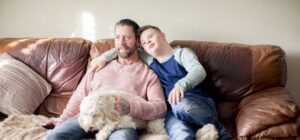 Carers Australia and the National Carer Network commissioned the Caring Costs Us: The economic impact on lifetime income and retirement savings of informal carers report (Caring Costs Us Report). Based on economic modelling and microsimulation, the Caring Costs Us Report was prepared by Evaluate which is an independent private economic consulting practice, with a particular focus on social policy.
Carers Australia and the National Carer Network commissioned the Caring Costs Us: The economic impact on lifetime income and retirement savings of informal carers report (Caring Costs Us Report). Based on economic modelling and microsimulation, the Caring Costs Us Report was prepared by Evaluate which is an independent private economic consulting practice, with a particular focus on social policy.
The Caring Costs Us Report acknowledges but does not deal with the human complexity of decisions to care. The focus is on highlighting the economic impact of unpaid care, specifically, lost income during working life and the longer-term reduction in accruing superannuation which affects retirement savings. In economic terms this is called the ‘opportunity cost of caring’. Read the full report.
Screen time, alcohol & poor sleep for girls: how the pandemic impacts our teens
 The first study to comprehensively examine how young people’s health behaviours changed over a two-year period encompassing the COVID-19 pandemic finds both pros and cons. Australian teens had overall improvements in sleep over the two years and some improvements in dietary choices during lockdown, however these were offset by increases in already concerning levels of screen time and worrying trends of alcohol use and poor sleep among girls.
The first study to comprehensively examine how young people’s health behaviours changed over a two-year period encompassing the COVID-19 pandemic finds both pros and cons. Australian teens had overall improvements in sleep over the two years and some improvements in dietary choices during lockdown, however these were offset by increases in already concerning levels of screen time and worrying trends of alcohol use and poor sleep among girls.
The study, led by the University of Sydney, adds important new data to the growing chorus of concern around the long-term impacts of COVID-19 on young people. It also emphasises the importance of tailoring support and interventions to address specific concerns and groups – such as adolescent girls – who appear to be most impacted. Find out more.
New nationwide Indigenous Helpline
 For the first time, First Nations people across Australia will have access to a culturally safe, dedicated, 24/7 crisis hotline.
For the first time, First Nations people across Australia will have access to a culturally safe, dedicated, 24/7 crisis hotline.
13YARN is an Aboriginal & Torres Strait Islander crisis support line funded by the Australian Government with the support of Lifeline and developed in collaboration with Gayaa Dhuwi (Proud Spirit) Australia. It is run by Aboriginal and Torres Strait Islander people.
The line is co-designed using Lifeline expertise with several Aboriginal mental health professionals including NACCHO, Black Dog Institute Aboriginal Lived Experience team and the Centre for Excellence in Suicide Prevention along with input from Torres Strait Islander, remote, regional, and urban peoples with lived experience.
World Elder Abuse Awareness Day – 15 June
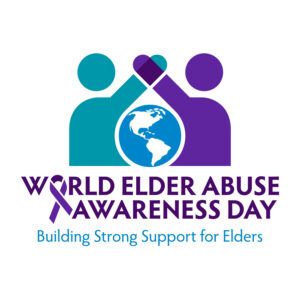
World Elder Abuse Awareness Day (WEAAD) is commemorated each year on 15 June to bring attention to the growing issue of elder abuse.
Elder abuse is any act which causes harm to an older person and is carried out by someone they know and trust such as a family member or friend. The abuse may be physical, social, financial, psychological or sexual and can include mistreatment and neglect.
World Elder Abuse Awareness Day, or WEAAD, is an annual initiative launched on June 15, 2006, by the International Network for the Prevention of Elder Abuse and the World Health Organization.
WEAAD was officially recognised by the United Nations General Assembly in December 2011, following a request by the International Network for the Prevention of Elder Abuse.
The World Health Organisation has noted that from a global perspective, around one in six people 60 years and older experienced some form of abuse in community settings in 2021. This resonates with the Australian experience. The National Elder Abuse Prevalence Study, undertaken by the Australian Institute of Family Studies and released end of 2021, found that one in six older Australians reported experiencing abuse in the twelve months prior to being surveyed (this did not include those in residential aged care).
Individuals, communities, and organisations will come together across the globe to hold events on 15 June that raise awareness of elder abuse.
The Coordinated Enforcement and Support to Eliminate (CEASE) Domestic Violence Program
The CEASE Domestic Violence Program comprises the implementation and evaluation of police-led multi-agency focused deterrence interventions for domestic violence across three local sites in Australia.
The CEASE Program is based on the principles of focused deterrence, modelled on the Intimate Partner Violence Initiative developed by the National Network for Safe Communities at John Jay College in New York. The program is trialling a focused deterrence-based approach to reducing domestic violence in Australia.
This project aims to establish and deliver a pilot of focused deterrence-based interventions to domestic violence across three local sites in Australia; and evaluate the interventions to build a national evidence base on focused deterrence approaches to domestic violence in an Australian context.
The Australian Institute of Criminology (AIC) will work closely with local-level police and other partners to assist in establishing and implementing the focused deterrence-based intervention to domestic violence across the sites.
The AIC will employ a mixed methods approach that draws on qualitative and quantitative data from victim-survivors, intervention stakeholders, intervention documentation and administrative databases.

Appointment of Attorney-General and Minister for Social Services
On 31 May, the Prime Minister the Hon. Anthony Albanese announced his Government’s first full Ministry. The two portfolio positions relevant to the family and relationships services sector are the Minister for Social Services and the Attorney-General, who oversee the Departments responsible for the funding of services under the Families and Children Activity.
- Attorney-General –The Hon. Mark Dreyfus QC MP
The Hon Mark Dreyfus QC MP was appointed Attorney-General on 1 June 2022. He was elected to Parliament in 2007 as the Member for Isaacs. Mr Dreyfus studied Arts and Law at the University of Melbourne. He practised law as a solicitor and from 1987 as a barrister. In 1999 he was appointed Queen’s Counsel.
Mark Dreyfus served as Cabinet Secretary and Assistant Minister for Climate Change in the Gillard Government, and later as Attorney-General, Minister for Emergency Management, Minister for the Public Service and Integrity and as Special Minister of State in the Gillard and second Rudd Governments.
- Minister for Social Services – The Hon. Amanda Rishworth MP
The Hon. Amanda Rishworth MP was appointed Minister for Social Services on 1 June 2022.
Amanda Rishworth was elected as the Member for Kingston 2007. She was previously Shadow Minister for Early Childhood Education and Development and Shadow Minister for Youth. Prior to that she was Shadow Minister for Veterans’ Affairs and Defence Personnel.
Amanda graduated with a Bachelor of Psychology Honours from Flinders University and a Masters Degree in Psychology from Adelaide University. After graduating, Amanda practised as a psychologist working with General Practitioners in the delivery of mental health care to the community.
Shadow Ministry announced
On 5 June, Federal Opposition Leader Peter Dutton unveiled his new shadow ministry with New South Wales Liberal MP, Julian Leeser, announced as the Shadow Attorney-General and Michael Sukkar announced as the Shadow Minister for Social Services.
FRSA looks forward to a productive working relationship with the Attorney-General and Minister Rishworth, and their shadow counterparts.
Families and Children Activity Newsletter – Issue 5 released
The Department of Social Services (DSS) has released issue 5 of the Families and Children Activity Newsletter, which should soon be available on the Department’s website.
Issue 5 covers:
- important information on the Families and Children Activity review point
- reminders about program logics
- reminders about Data Exchange requirements that take effect on 1 July 2022
- a pre-recorded Data Exchange webinar that will be published soon
- information on the Data Exchange client survey
- important information on activity work plans
- information on promoting vaccination
This issue outlines a number of upcoming key dates and we encourage members to take a look and reach out to DSS if they have any questions.
Please note: correction to issue 5 circulated
On 7 June, DSS circulated a correction to issue no. 5 of the newsletter about the DEX Client Survey, which was first sent to recipients on 3 June. Issue 5 has since been updated.
The newsletter incorrectly stated that the client survey does not apply to Family and Relationship Services. To clarify, the client survey does apply to Family and Relationship Services, but does not apply to Specialised Family Violence Services.

National Reconciliation Week
It was National Reconciliation Week on 27 May to 3 June 2022, this year’s theme urged us all to Be Brave and tackle the unfinished business of reconciliation so we can Make Change for the benefit of all Australians.
Check out how FRSA members celebrated the week:
- EACH unveiled their Reconciliation Artwork at a special event in Ipswich, Queensland. Each symbol used in the artwork was carefully chosen to represent EACH’s journey: their programs and services, the places they meet, the states where they operate, their commitment to healing past traumas and making positive change towards reconciliation and how far they have come in their journey by working closely with Aboriginal and Torre Strait Islander staff.
- BaptistCare has begun work on developing their own Reconciliation Action Plan.
- Centacare Catholic Family Services placed crocheted mauve native hibiscus flowers at a tree trunk in the Memorial and Healing Garden at Stebonheath Park, Playford, where Centacare’s Care and Support Services (CASS) Aboriginal Elders Group meet monthly. The flower is the official symbol for Sorry Day and represents the resilience of the Stolen Generation, compassion and spiritual healing.
- Gateway Health made a video about their second Reconciliation Action Plan.
- YFS staff took part in yarning sessions with local community elders who spoke about traditional art.
- ac.care launched a mural at their Mount Gambier Family Relationship Centre by Boandik artist Bonnie-May Saunders for National Reconciliation Week. Installation of the artwork is part of a revamp of the Mount Gambier Family Relationship Centre to ensure it is welcoming to all and pays respect to Boandik people as the traditional owners of the land ac.care staff live and work on in Mount Gambier.
- Relationships Australia Queensland shared their Lead First Nations Community Engagement & Cultural Advisor, Aunty Debra Bennet’s words on reconciliation.
- Centacare shared hundreds of hands created by children from across their Catholic Early EdCare services that were placed on the lawn at St Stephen’s Cathedral. Each ‘hand of commitment’ captures a child’s hope for reconciliation in Australia.
- CatholicCare Victoria has engaged Indigenous Employment Partners to undertake a First Nations Cultural Safety Project. The project will include: a Cultural Reflections Survey, a Cultural Safety Framework and Cultural safety learning strategy, a Cultural Safety Check and safety and wellbeing strategies. They also shared the importance of the Message Stick and how it is a sacred symbol of the Aboriginal people and is itself a powerful symbol of reconciliation.
- AnglicareNT created a video asking staff what reconciliation means to them. (Watch the video under the photo gallery).
- Uniting Country SA held Reconciliation activities as part of their Peterborough Parenting Group, and along with Centacare Catholic Country SA took part in a Youth Event in Port Augusta.
- Relationship Matters staff got together to learn about their shared histories, cultures and achievements and explore how everyone can help achieve Reconciliation in Australia.
- Centrecare Inc’s Kalgoorlie branch together with City of Kalgoorlie-Boulder, National Indigenous Australian Agency and PCYC (WA) gathered at Kingsbury Park for lots of activities to celebrate Reconciliation Week.
- Tamworth Family Support Services sponsored three award categories at the Moree Plains Shire Council’s 2022 Reconciliation Week Awards.

Centacare Family Services bids farewell to Director

Last month Centacare Family Services said farewell to Director Perlin Simon. Perlin was in the role since 2019 and now moves into the Chief Executive Office role at Bawinanga Aboriginal Corporation.
David Power has been appointed Acting Director/CEO as they search for a new Director.
FRSA wishes Perlin all the best in her new role.
Save the Children Australia announces new CEO
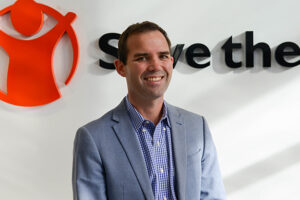
Save the Children Australia has announced the appointment of Mat Tinkler as its new Chief Executive Officer.
Mat takes up the position from Paul Ronalds, who led the organisation for more than nine years before resigning to lead the establishment of Save the Children Global Ventures.
For the past six months, Mat has been acting CEO of Save the Children Australia while Paul was developing a business case for the new global entity that will amplify Save the Children’s impact through innovative financing and taking new technologies to scale. Read more.
Relationship Matters says goodbye to CEO

After 8 years of service, Janet Jukes OAM has announced her departure as Chief Executive Officer of Relationship Matters. Since 2014 Janet has played a critical role in the improvement, growth and success of the organisation. Her last day is Friday, 1 July 2022.
The Relationship Matters Board will be undertaking a search to find a new CEO over the next few months. During this transition period, Executive Manager Service Development and Quality, Ann Smith has been appointed as the Acting/Interim CEO.
FRSA wishes Janet all the best in her new endeavour.

Future-proofing Safety: COVID-19 and Family Violence in Victoria Sector Survey
The Australian Institute of Family Studies has set up a survey to gather information from Victorian practitioners working in family violence and related services. The Institute wants to better understand practitioner views on how client experiences of family violence changed during COVID-19 and how services adapted to meet needs.
The survey closes at the end of the month and takes about 20 minutes to complete. View the project information sheet or complete the survey here.
Have your say about Commonwealth funding to ACCOs
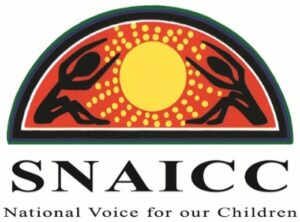 SNAICC has been engaged by the Department of Social Services (DSS) to identify any barriers that Aboriginal and Torres Strait Islander Community Controlled Organisations (ACCOs) can face in accessing Commonwealth funding for children and family services and how these can be solved.
SNAICC has been engaged by the Department of Social Services (DSS) to identify any barriers that Aboriginal and Torres Strait Islander Community Controlled Organisations (ACCOs) can face in accessing Commonwealth funding for children and family services and how these can be solved.
Survey responses are anonymous, and participation is voluntary, you can exit the survey at any time by closing the browser.
The survey takes around 15 minutes to complete and closes on Monday, 20 June 2022 . Complete the survey here.
If you have any questions or concerns about the survey or this project you can contact the policy and research team at SNAICC via Emily Armstrong, emily.armstrong@snaicc.org.au or call (03) 9419 1921.
Where you belong - Refugee Week 2022 (19-25 June)
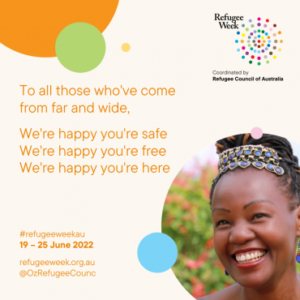 Refugee Week is coming up from 19-25 June 2022. The week shines a spotlight on the extraordinary people who have come to Australia seeking safety, connection and a new life for themselves and their family.
Refugee Week is coming up from 19-25 June 2022. The week shines a spotlight on the extraordinary people who have come to Australia seeking safety, connection and a new life for themselves and their family.
This year’s Refugee Week theme is “Healing”, which can occur through storytelling, through community and through the realisation of our intrinsic interconnectedness as individuals.
Find out how to get involved and download resources via the Refugee Week website.
Effective Online Group Leadership Workshop
SUNSHINE CIRCLES – Albury
SUNSHINE CIRCLES – Shepparton
HEY LITTLE WARRIOR – Sale
Supporting Children and Young People with Disability in Challenging Times | 15 June 2022 | Families Australia
Families Australia will be hosting an online Policy Forum on Wednesday 15 June 2022 from 11:00am – 13:30pm (AEDT).
The upcoming policy forum aims to discuss ways of supporting children and young people with disability through a variety of challenging contexts such as family violence, the COVID pandemic and the challenges for families navigating systems such the NDIS. Children and young people with disability and their parents/carers, are an identified priority group of Safe and Supported: The National Framework for Protecting Australia’s Children 2021-2031.
ACT
Senior Research and Evaluation Officer | Relationships Australia Canberra & Region
NT
Manager Counselling – Family and Relationship Services | Relationships Australia NT
Family Dispute Resolution Practitioner (Full Time or Part Time) | Relationships Australia NT
Family Dispute Resolution Practitioner (FDRP) and Family Law Pathways (FLPN) Project Officer | Relationships Australia NT
Family Dispute Resolution Practitioner | Relationships Australia NT
VIC
Assistant Manager – Berwick | Relationships Australia Victoria
Family Dispute Resolution Practitioner | Relationships Australia Victoria
Family Safety Practitioner | Relationships Australia Victoria
Counsellor Couple, Family and Child – Boronia | Relationships Australia Victoria
Family Safety Practitioner – Family Law Navigation | Relationships Australia Victoria
Counsellor Couple, Family and Child | Relationships Australia Victoria
Family Dispute Resolution Practitioner | EACH
Family Violence Pathways Practitioner (Mens) | Relationships Australia Victoria
Coordinator Family Violence – Sunshine | Relationships Australia Victoria
Family Violence Practitioner and Case Manager – Sunshine | Relationships Australia Victoria
If you have any events you’d like listed on the FRSA Events and Training Calendar or job vacancies you’d like listed on the FRSA Jobs Board, email Communications Officer, Vanessa Lam at communications@frsa.org.au. Please note that posting onto the FRSA website is reserved for FRSA Members only.

Who is responsible for ensuring food security in NSW? | Institute for Sustainable Futures
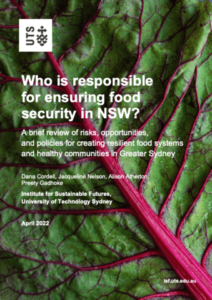 The double crises of COVID-19 and catastrophic bushfires in 2020 exposed underlying fragilities in Australia’s food security, particularly with the sustainability of local supply chains and access to affordable, healthy food in vulnerable populations. This report identifies and articulates three steps on a way forward to ensure food security and the resilience of food systems in Sydney and New South Wales.
The double crises of COVID-19 and catastrophic bushfires in 2020 exposed underlying fragilities in Australia’s food security, particularly with the sustainability of local supply chains and access to affordable, healthy food in vulnerable populations. This report identifies and articulates three steps on a way forward to ensure food security and the resilience of food systems in Sydney and New South Wales.
Managing access to social housing in Australia: unpacking policy frameworks and service provision outcomes | City Futures Research Centre (UNSW)
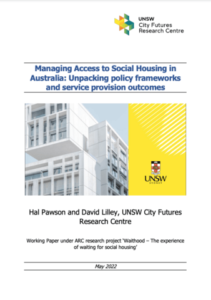 This report presents an overview of the policies and quantitative data associated with the management of access to social housing in Australia. That is, the rules and procedures that govern the allocation of social housing properties, and the handling of tenancy applications.
This report presents an overview of the policies and quantitative data associated with the management of access to social housing in Australia. That is, the rules and procedures that govern the allocation of social housing properties, and the handling of tenancy applications.
Better, bigger, stronger: Responding to the mental health care needs of unaccompanied homeless children in Tasmania | Anglicare Tasmania
This report offers insight into the lives of Tasmanian children and young people who experienced homelessness and mental ill-health alone. It also details the experiences of professionals who respond to the complex and competing needs of unaccompanied homeless children.
Beyond safety: Ethical practice involving children: Summary of research findings: Phase 2: Interviews and focus groups | Southern Cross University
This report examines the the role of ethical practice in improving children and young people’s safety and wellbeing when building child safe organisations.
Alternative housing models for precariously housed older Australians | Australian Housing and Urban Research Institute
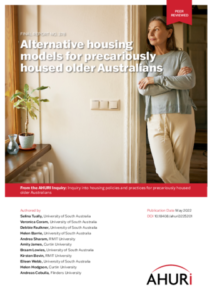 This research investigates the potential of alternative housing models to increase the supply of affordable housing for older Australians and the role alternative financing schemes could play in expanding those options.
This research investigates the potential of alternative housing models to increase the supply of affordable housing for older Australians and the role alternative financing schemes could play in expanding those options.
Toward a socio-ecological understanding of adolescent violence in the home by young people with disability | Australia’s National Research Organisation for Women’s Safety
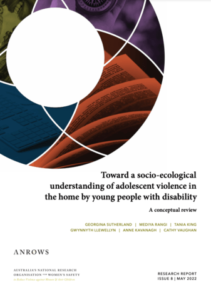 Adolescent violence in the home (AVITH) describes a range of violent, abusive and intimidating behaviours used by young people against family members, most commonly parents and siblings. This report presents findings from Stage 1 of a larger project which aims to use multidisciplinary bodies of knowledge, and input from families, to develop a conceptual framework that examines and explains the intersection of AVITH, gender and disability.
Adolescent violence in the home (AVITH) describes a range of violent, abusive and intimidating behaviours used by young people against family members, most commonly parents and siblings. This report presents findings from Stage 1 of a larger project which aims to use multidisciplinary bodies of knowledge, and input from families, to develop a conceptual framework that examines and explains the intersection of AVITH, gender and disability.
Intervention programme for fathers who use domestic and family violence: Results from an evaluation of Caring Dads | Child & Family Social Work
This article details an evaluation of Caring Dads, a men’s behaviour change program trialled in two Australian locations.
Volunteers and volunteering during the COVID-era in Australia | Centre for Social Research and Methods (ANU)
In 2021, the Australian government announced the development of a National Strategy for Volunteering, with the design of this strategy being led by Volunteering Australia. The ANU Centre for Social Research and Methods is undertaking research to support the development of the strategy.
“They thought it was safe – but it wasn’t” | Whitlam Institute
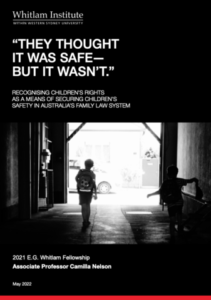 This report makes policy recommendations designed to enhance children’s safety by bringing the Australian family law system into alignment with children’s rights. It illustrates its case for reform with the findings of a multiple case study project comprising seven in-depth interviews with adult survivors of family violence whose parents went to court when they were children.
This report makes policy recommendations designed to enhance children’s safety by bringing the Australian family law system into alignment with children’s rights. It illustrates its case for reform with the findings of a multiple case study project comprising seven in-depth interviews with adult survivors of family violence whose parents went to court when they were children.
Findings from the 50 Lives 50 Homes program: final evaluation report 2022 | The Centre for Social Impact
The ’50 Lives’ program pioneered the launch of ‘Housing First’ into the homelessness service system and onto the political agenda in Western Australia in late 2015. Fast forward to this final evaluation report, and the ’50 Lives’ collective impact program has supported nearly 300 people, with 73% still permanently housed.
Mental Health, Quality of Life and Coping Strategies in Vulnerable Children During the COVID-19 Pandemic | Better Care Network
This study analysed the consequences after one year of the pandemic on a group of children and adolescents assessed at the beginning of the pandemic in 2020 and to determine the most effective ways of psychologically coping with this pandemic.
Measuring the gap in health expenditure: Aboriginal and Torres Strait Islander Australians | Equity Economics & National Aboriginal Community Controlled Health Organisation
Equity Economics, in partnership with the National Aboriginal Community Controlled Health Organisation (NACCHO), undertook this analysis of the gap in health expenditure for Aboriginal and Torres Strait Islander people. In order to calculate the gap, they accounted for the burden of disease, which is more than twice the rate for the Aboriginal and Torres Strait Islander population than for the non-Indigenous population.
Want to submit something to the FRSA eBulletin?
If you have an news item or event that you would like to be featured in a future eBulletin please submit your announcement via the form below or email communications@frsa.org.au with the subject “FRSA eBulletin submission”.
Please note FRSA members receive priority for items posted in the eBulletin. And to keep information current, relevant and useful, submissions will not be repeated from week to week.
Subscribe
Subscribe to receive future eBulletin editions directly to your inbox!






